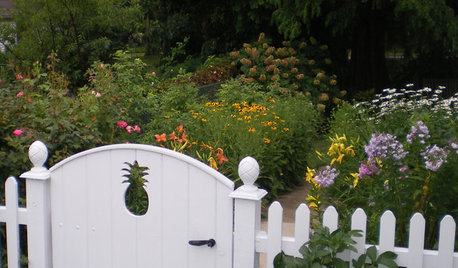Lessons From Captain Kirk
ironbelly1
19 years ago
Related Stories

FURNITURE16 Favorite Chairs from High Point Market
Finds from the world's largest furnishing show: Big patterns, chic lines, and a chair worthy of the Starship Enterprise
Full Story
HOME OFFICESPhoto Flip: 95 Deskscape Dazzlers
Whether you work from home or just need a stylish space in which to pay the bills, these office spaces make the grade
Full Story
LIFE10 Ideas for Making Screen-Free Play a Reality
Here's how to tempt your children with activities that will encourage their creativity and keep them away from the TV
Full Story
SMALL HOMESAsk an Expert: What Is Your Ultimate Space-Saving Trick?
Houzz professionals share their secrets for getting more from any space, small or large
Full Story
ARCHITECTUREStates of Style: Arizona's Grand Appeal
From golden sunsets to turquoise gemstones, this desert state embraces colorful and bold design
Full Story
LANDSCAPE DESIGNEasy Ways to Manage Stormwater for Lower Bills and a Healthier Earth
Send cleaner runoff into local waterways and spend less on yard irrigation with these simple landscaping approaches
Full Story
DECORATING GUIDESDesign Mystery: Why Do Pineapples Sprout Up in Home Design?
Early Americans were bananas about pineapples — and we’re still reaping the benefits of the sweet fruit’s symbolism today
Full Story
KIDS’ SPACESHow to Turn Your Basement into a Kids' Playroom
Keep costs down by sticking with secondhand furniture and quick, yet functional, fixes
Full Story
GREAT HOME PROJECTSWhat to Know Before Refinishing Your Floors
Learn costs and other important details about renewing a hardwood floor — and the one mistake you should avoid
Full Story
HOUZZ TOURSMy Houzz: Yard Seals the Deal for an Eichler Home
Expansive indoor-outdoor living sold a couple on this midcentury California home, now brimming with vintage finds collected over time
Full StorySponsored
More Discussions







napapen
ltcollins1949
Related Professionals
Lyons Landscape Architects & Landscape Designers · Finneytown Landscape Architects & Landscape Designers · Edmond Landscape Contractors · Mooresville Landscape Contractors · Allentown Landscape Contractors · Anderson Landscape Contractors · Soddy Daisy Landscape Contractors · South Lake Tahoe Landscape Contractors · Oxon Hill Landscape Contractors · East Norriton Landscape Contractors · Fort Pierce General Contractors · Lighthouse Point General Contractors · Saint Paul General Contractors · Signal Hill General Contractors · Titusville General Contractorsback_yard_guy
calistoga_al ca 15 usda 9
jean001
back_yard_guy
huffy1
ejb190
IslandKat
ginger_nh
ironbelly1Original Author